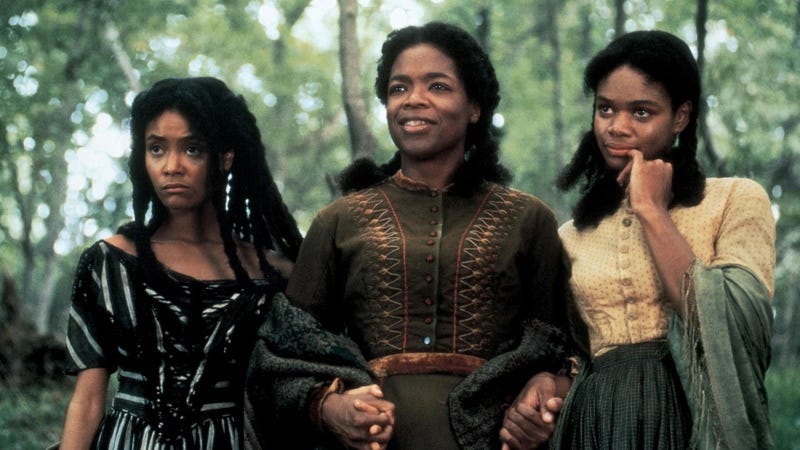Notes on Beloved (1998)
Dallas Knox reviews the 1998 adaptation of Toni Morrison's Southern Gothic novel Beloved
As an autumn chill sets in, readers of literary fiction might find themselves reaching for Toni Morrison’s atmospheric and haunting novel Beloved, but did you know it has a film adaptation? If your answer is no, you’re not alone; despite being released in 1998, this movie has managed to slip from our cultural memory. I’m writing this review in hopes of inciting a revival of the Black film, which is a skillful and faithful revision of the Pulitzer Prize winner.
Here’s a brief synopsis of the story, for readers who need a refresh and for impending Morrison fans: Set in 1873, we follow the life of Sethe, a former runaway slave living in an incessantly haunted house with her young adult daughter, Denver. The two women live in near isolation with only a ghost for company, a very familiar one. They believe it to be Beloved, Sethe’s first daughter, whose throat she slit in an effort to save her children from being recaptured due to the Fugitive Slave laws. One day they’re paid a visit by Paul D, another former slave who lived with Sethe on the plantation "Sweet Home." The two begin a cautious relationship, and Paul D manages to scare away the ghost permanently. So imagine their surprise when a beautiful young woman dressed in black, soaking wet, and with a gnarly scar under her chin shows up on their porch after the trio returns from a carnival. Her body is frail, and she struggles to breathe, but when asked, she tells them her name—it’s Beloved.
Shortly after the novel’s release in 1987, Oprah purchased the rights for adaptation, and it would be her production company Harpo’s first feature film. It involved a star-studded cast including Oprah herself, Danny Glover, Thandie Newton, and Kimberly Elise. The movie was also directed by Silence of the Lambs (1991) director Jonathon Demme. Despite these impressive credits and budget (said to be 80 million), it was a complete box office blunder, barely breaking a quarter of its cost in revenue. Though it didn’t draw a large audience, it was well received by critics and viewers alike, mostly familiar with the source text, which the film does not stray far from.
Part historical drama, part horror, the film is visually stunning, especially in contrast to the hideous violence of slavery, which is of course highlighted in the plot. The costuming is also spectacular and earned the costume designer, Colleen Atwood, an Oscar nomination for Best Costume Design. In combination with the convincing set design, the film immerses viewers in the humble Ohio in the mid-19th century. Like all Morrison works, Beloved is not told in a linear fashion and jumps between the present day and Sethe’s time as a slave. In my opinion, this is where the beauty of the visual format really shines its light on the adaptation. The flashback scenes in this movie are masterful and manage to portray the personal horror of slavery without being overly explicit. Similar to the cinematography in The Silence of the Lambs, Demme utilizes point-of-view shots that place the audience directly in the shoes of the protagonist. For example, when we see the memory of Sethe having her milk stolen from her white masters, it’s captured as if we were Sethe herself, lying on her back with her breasts exposed and the faces of her perpetrators distorted by their closeness to the camera. These intimate shots prevent the viewer from looking away, physically or mentally; their vision is fixed because they are a part of the story, a witness or victim themselves.
Overall, the film is a perfect candidate for those seeking an eerie yet fruitful historical drama for the Halloween season and beyond. To date, Beloved is the only work by Toni Morrison to be adapted into a visual format, but hopefully not the last. Though the film didn’t succeed commercially, artistically it was a triumph of Black storytelling and showed immense respect for her original vision.
Dallas Knox (they/them) is a 4th year at the University of Chicago studying religion, gender, and sexuality. They self-identify as a poet/wannabe culture critic and take a special interest in: Black women's writing, Toni Morrison, liberation theology, southern literature and contemporary art. They're also a proud Appalachian hailing from Chattanooga, Tennessee, and therefore a lover of porches and sweet tea. tune in @ dallas.reznikoff on Instagram




